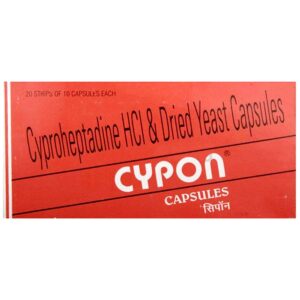CYPROHEPTADINE + DRIED YEAST
Cyproheptadine: Cyproheptadine is a medication used to relieve symptoms associated with allergies and to increase appetite. It is commonly prescribed to treat conditions such as allergic rhinitis, vasomotor rhinitis, allergic conjunctivitis, and pruritus (itching).
The primary mechanism of action of cyproheptadine is blocking the effects of histamine, a substance released in the body during an allergic reaction. By inhibiting histamine receptors, it reduces allergy symptoms like sneezing, itching, watery eyes, and runny nose. It also has anticholinergic activity, which helps in reducing the symptoms caused by the overactivity of the neurotransmitter acetylcholine.
The typical recommended dose of cyproheptadine for adults is 4-20 mg daily, divided into two or three smaller doses. For children, the dose is based on their age and weight and is usually lower than that for adults. It is important to follow the prescribed dosage and usage instructions provided by a healthcare professional.
While cyproheptadine is generally well-tolerated, it may cause certain side effects. Common side effects include drowsiness, dizziness, dry mouth, blurred vision, constipation, and increased appetite leading to weight gain. These side effects are usually mild and transient. In some cases, it can also cause more serious side effects such as confusion, hallucinations, rapid heartbeat, difficulty urinating, and allergic reactions. It is important to monitor for any unexpected or severe side effects and consult a healthcare professional if they occur.
Dried Yeast: Dried yeast, also known as Saccharomyces cerevisiae, is a type of yeast that is used as a nutritional supplement. It is commonly available in the form of powder or tablets and can be found in health food stores.
Dried yeast is primarily used to supplement the diet with essential nutrients such as vitamins, minerals, and proteins. It is a rich source of B vitamins, including thiamine (B1), riboflavin (B2), niacin (B3), pyridoxine (B6), and folic acid (B9). It also contains minerals like magnesium, potassium, and zinc. Additionally, dried yeast is a complete protein, containing all the essential amino acids required by the body.
The mechanism of action of dried yeast is mainly related to its nutritional content. B vitamins are essential for various metabolic processes in the body, including energy production, DNA synthesis, and nervous system function. The minerals in dried yeast contribute to maintaining electrolyte balance and supporting proper cellular function. The protein content plays a role in muscle repair and growth.
The recommended dose of dried yeast can vary depending on individual needs and the specific brand or product. The usual range for adults is around 2 to 3 tablespoons (around 30 to 45 grams) per day, which can be mixed into food or beverages. It is advisable to follow the dosage instructions provided by the manufacturer.
While dried yeast is generally considered safe for consumption, there can be potential side effects in some individuals. These may include allergic reactions, such as skin rashes or itching. Some people may also experience digestive discomfort, such as bloating, gas, or diarrhea, especially if consumed in excessive amounts.
It is important to note that dried yeast should not be used as a substitute for a varied and balanced diet. If you are considering using dried yeast as a nutritional supplement, it is recommended to consult with a healthcare professional or a registered dietitian to ensure it is appropriate for your specific dietary needs and overall health.

